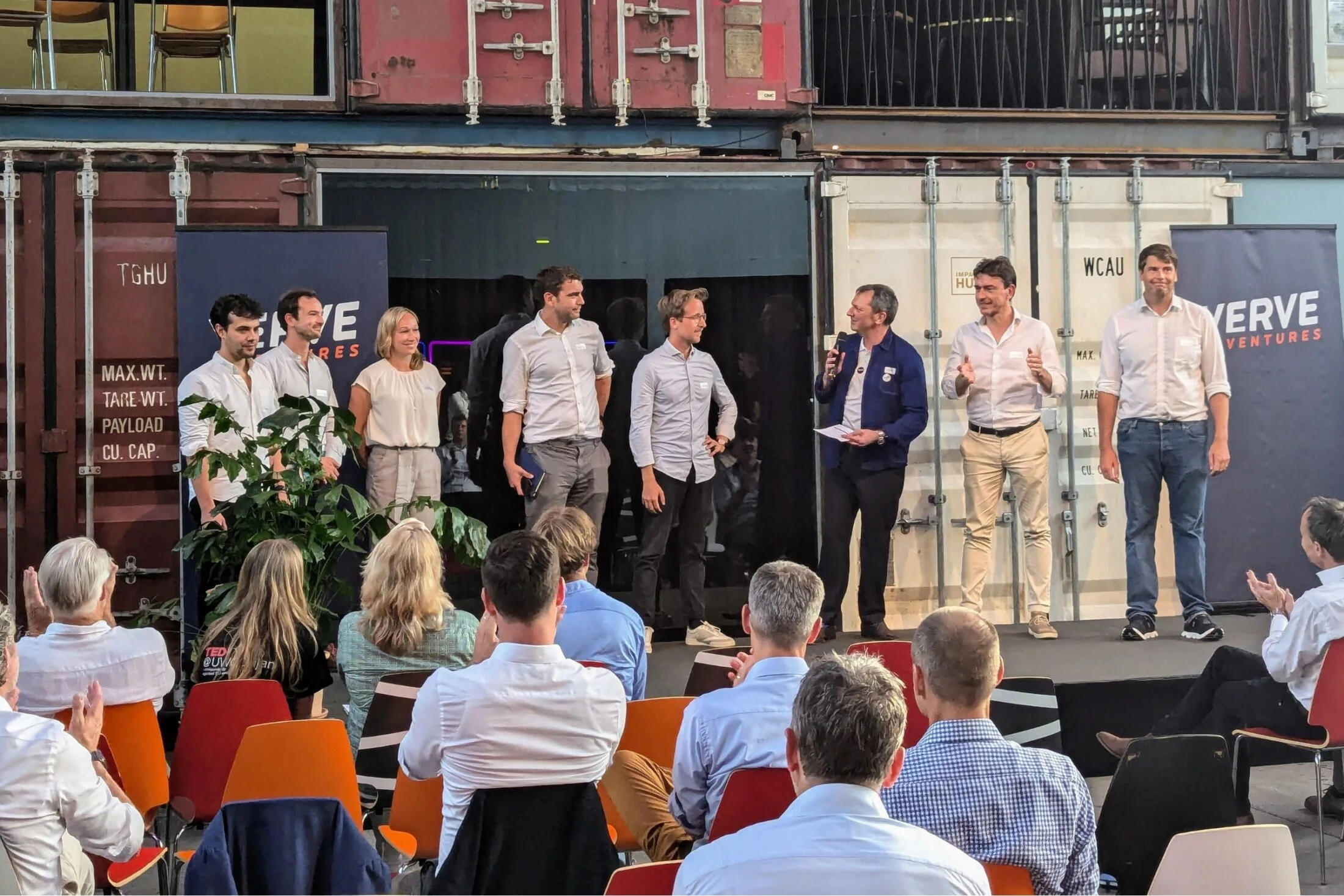Hardware startups can’t rush their way from prototype to commercial product. ecoRobotix has to deal with this tension – and with farmers armed with high-pressure washers.
“We cannot go faster than nature”, says Aurélien G. Demaurex, co-founder of ecoRobotix. Sugarbeet is harvested in autumn, at the same time canola is sown. Beans are ripe in July, Spinach and lettuce earlier in the year. These and other high-value crops are the target market of ecoRobotix. For this reason, the times when the ecoRobotix team can test their robot in the field are limited. The robot itself looks like a ping-pong table on wheels that decided to discover the great outdoors. Powered by the sun and equipped with dexterous arms, it recognizes weeds with its camera and sprays them with a tiny amount of herbicide. These precise movements are more elegant than dousing the whole field, including the plants we eat, with chemicals. This reduces the need for herbicide by 95% and saves the farmer a lot of money. Treating the surface corresponding to a football field with herbicides might cost up to CHF 700.
Things have changed since Aurélien started the company together with Steve Tanner. They no longer tinker in the garage of Steve’s farm but work in the Y-Park business and innovation center in Yverdon-les-Bains (Switzerland). In 2018, ecoRobotix raised USD 10.7 million in a series B funding round led by BASF, a German chemical company. The team has grown to 20 people, and about the same number of robots are already active in the field. They are being tested by research institutes and agricultural cooperatives, who compare their effectiveness in weed control against the traditional method of spraying the whole field with pesticides. Do the robots recognize different kinds of weeds reliably? Or do they miss some of them? The feedback from these tests is encouraging, says Aurélien. The quality of the robots’ work is comparable to indiscriminate spraying, but their use costs less.
This is lettuce
Steve and Aurélien built the first prototype in 2014. With a seed financing round and a research project financed by the Swiss Confederation, they improved on the prototype the next year and tested it in different environments and countries. They worked on the software that allows the robot to recognize and differentiate between the good, the bad and the ugly, effectively telling apart a plant from a weed and a stone. “What we do is no longer standard machine learning but deep learning instead”, explains Aurélien. Deep learning means that the computer is fed thousands upon thousands of pictures which it subsequently uses to decide about the nature of what it sees. “ecoRobotix brings the precision of robotic arms guided by computer vision to the agricultural field”, says investment manager Chris Gay-Crosier from investiere. The forces of nature impact the robot’s abilities as well; when clouds hang in the sky, its vision works even better than when the sun shines and a part of the field is covered by shadows.
The 6th version of the robot has just been developed. The team has already spent uncountable hours on improving the hardware, giving the robot better traction, making it move faster, optimizing size and positioning of the solar panels. Even if the robot already did work well, the two founders wanted someone with experience in product design to review the complete hardware for potential reliability and safety problems during the machine lifetime. Such a review might seem costly, but it can avoid much larger expenses in after-sales services during the first years of commercialization. For this, ecoRobotix turned to Helbling, an engineering and consulting firm. Ueli Schläpfer, who leads the mechatronics development group, has been with the firm for 20 years and works with many different clients, from startups to global enterprises. “I came to Helbling as a young engineer and liked to work every few months on different projects and to be on top of technical developments. And I still like that”, Ueli says. Clients turn to Helbling when they need to develop the next generation of an existing or even a new product and want to strengthen their own innovation forces with external ideas, know-how, and experience. Sometimes they entrust the whole development of a machine to Helbling’s engineers.
Dissecting the robot
For startups, time-to-market is of the essence, says Ueli. But at the same time, a hardware product must be reliable and sturdy enough when it is launched, especially when used among tractors. The founders have to be able to balance this tension between product maturity and early commercialization. This, in turn, is made possible by a stable funding base. ecoRobotix came to Helbling quite late in the development process, for an analysis of the status quo, as it is often the case with technology-oriented startups, Ueli explains. When asked where he saw ecoRobotix’ robot for the first time, he says it was probably at the Swiss Robotics Industry Day organized by NCCR Robotics. He was curious about the design, which, for an agricultural machine, looks quite delicate, he says. After all, the robot weighs only about 100kg.
For the design review, two of Helbling’s engineers spent around two months working mainly on this project. “We looked at it in great detail”, Ueli says. How well does the overall design solve the requirements? How robust is the overall design, where are the most likely points of failure in typical use cases? Will it corrode, or will cables break in the long term? What about electromagnetic compatibility of the onboard electronics? Security aspects were examined, and so was the ease of manufacturing the robot at scale. ecoRobotix will not build a robot factory. It will but outsource the production once the design is finished.
As Aurélien explains, Helbling’s engineers came up with valuable input. They pointed out abnormal usage patterns that can result in machine damage or safety issues. For example, imagine a farmer who tries to wash the robot with the high-pressure water jet he uses to wash his other machinery. Such a rough treatment might breach the sealing of the electrical enclosures.
A design review like ecoRobotix ordered does come at a price, as it requires a thorough understanding of the results of many thousands of hours that smart people have invested in it. But it can assure that a project goes in the right direction, says Ueli. And this can reduce time-to-market and prevent bad surprises after a product launch. Aurélien says ecoRobotix’ team has learned that a designer should think about what could go wrong when the product is in the hands of the user. The ideal case would be, of course, to have no after sales service issues.
The pricing of the final product will allow for a short payback time on a farmer’s investment. Even if a price tag of, say, EUR 30’000 for a weeding robot might seem expensive from a layman’s perspective, this compares well with other farming equipment. An average tractor costs CHF 100’000 CHF, a spray system CHF 200’000, Aurélien explains. “A lot of people are waiting for the product launch”, he says. Farmers are under immense pressure to reduce costs and consumers urge them to reduce herbicide use.
Based on the insights from the design review, 2019 will be the final year of robustness and safety tests for ecoRobotix, with the 7th generation of their robot proving their skills in the fields of Europe. 2020 the finalized product will be available for use. Then, it will help to reduce the staggering amount of 2 million tons of herbicide that are sprayed on our food every year.

Written by
Investors

Our sophisticated investors include visionary family offices, leading wealth managers, institutions, founders, and senior executives. These individuals and organizations are all committed to shaping the next generation of innovation.
More News
The Start of a VC Journey
Let me take you through my journey to becoming a Visiting Analyst at Verve Ventures. I’m currently in the middle of my 6 months stay here, so I’ll focus on my questions before joining a venture capital fund, how I got in, and how it’s been so far.
“We fought seven years to get to our first million users”
Frédéric Mazzella built the world’s most successful carpooling company, BlaBlaCar, which is also one of the few European unicorns. We talked to him about buses, France as a startup country and his investments as a business angel.
Can machines pick startups?
Quantitative funds trade assets based on patterns found in data. Some VCs are excited about this idea - but are such approaches viable for venture investing?


